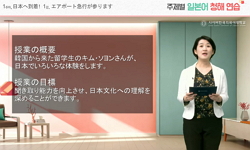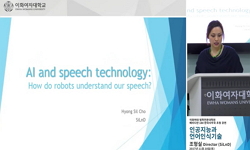Among the many factors that affect the seech perception, the present study aims to examine lexical effect on non-native perception of foreign accented speech and its interaction with language proficiency. A majority of previous studies on foreign acce...
http://chineseinput.net/에서 pinyin(병음)방식으로 중국어를 변환할 수 있습니다.
변환된 중국어를 복사하여 사용하시면 됩니다.
- 中文 을 입력하시려면 zhongwen을 입력하시고 space를누르시면됩니다.
- 北京 을 입력하시려면 beijing을 입력하시고 space를 누르시면 됩니다.

영어 비모국어 화자의 외국인 액센트 지각에 미치는 어휘 효과: 언어 숙달도와의 상호작용을 중심으로 = The Effect of Lexical Frequency on Perception of Foreign Accent in Non-native English Speech and Its Interaction with Language Proficiency
한글로보기부가정보
다국어 초록 (Multilingual Abstract)
Among the many factors that affect the seech perception, the present study aims to examine lexical effect on non-native perception of foreign accented speech and its interaction with language proficiency. A majority of previous studies on foreign accent have largely put an focus on speech production factors such as the first language, age of learning and length of residence. Relatively small amount of work has been accumulated in the field of foreign accent perception. In the present study, English native listeners and advanced and intermediate learners of English participated in an auditory foreign accent rating experiment. They listened to the target stimuli and rated the foreign accent by clicking an appropriate button in a seven-point scale presented on the screen. The lexical information such as token frequency turned out to be an factor affects the foreign accent perception. Also, results revealed the significant effect of lexical frequency and language proficiency and their interaction: high frequency words were consistency rated as less accented than lower frequency ones in English native and advanced learners of English, but not in intermediate learners of English.
참고문헌 (Reference)
1 김성아, "제 2 언어로서의 한국어 듣기에 있어 어휘 분포의 영향: 주변어휘 밀집도와 빈도수를 중심으로" 현대문법학회 53 (53): 207-223, 2009
2 김성아, "외국인 액센트 지각에 미치는 어휘 빈도수 효과" 경희대학교 2010
3 Goldinger,S, "Words and voices: perception and production in an episodic lexicon. In Talker Variability in Speech Processing" Academic Press 33-66, 1997
4 Pierrehumbert,J, "Word-specific phonetics" 7 : 101-140, 2002
5 Hooper,J.B, "Word frequency in lexical diffusion and the source of morpho-phonological change" North-Holland Pub 96-105, 1976
6 Savin,H.B, "Word frequency effect and errors in the perception of speech" 35 : 200-206, 1963
7 Fidelhotz,J.L, "Word frequency and vowel reduction in English. Proceedings of Chicago Linguistics Society 11" Chicago University Press 200-213, 1975
8 Nielsen,K, "The interaction between spontaneous imitation and linguistic knowledge" 105 : 125-137, 2007
9 McClelland, J. L., "The TRACE model of speech perception" 18 : 1-86, 1986
10 Nygarrd, L.C, "Talker-specific learning in speech perception" 60 : 355-376, 1998
1 김성아, "제 2 언어로서의 한국어 듣기에 있어 어휘 분포의 영향: 주변어휘 밀집도와 빈도수를 중심으로" 현대문법학회 53 (53): 207-223, 2009
2 김성아, "외국인 액센트 지각에 미치는 어휘 빈도수 효과" 경희대학교 2010
3 Goldinger,S, "Words and voices: perception and production in an episodic lexicon. In Talker Variability in Speech Processing" Academic Press 33-66, 1997
4 Pierrehumbert,J, "Word-specific phonetics" 7 : 101-140, 2002
5 Hooper,J.B, "Word frequency in lexical diffusion and the source of morpho-phonological change" North-Holland Pub 96-105, 1976
6 Savin,H.B, "Word frequency effect and errors in the perception of speech" 35 : 200-206, 1963
7 Fidelhotz,J.L, "Word frequency and vowel reduction in English. Proceedings of Chicago Linguistics Society 11" Chicago University Press 200-213, 1975
8 Nielsen,K, "The interaction between spontaneous imitation and linguistic knowledge" 105 : 125-137, 2007
9 McClelland, J. L., "The TRACE model of speech perception" 18 : 1-86, 1986
10 Nygarrd, L.C, "Talker-specific learning in speech perception" 60 : 355-376, 1998
11 Flege, J., "Talker and listener effects on degree of perceived foreign accent" 91 : 370-389, 1992
12 Johnson,K, "Speech perception without speaker normalization: an exemplar model. In Talker Variability in Speech Processing" Academic Press 1997
13 Nygarrd, L.C., "Speech perception as a talker-contingent process" 5 : 42-46, 1994
14 Mullennix, J. W., "Some effects of talker variability on spoken word recognition" 85 (85): 365-378, 1989
15 Flege,J, "Second language speech learning: Theory, findings and problems. In Papers in Laboratory Phonology 5: Acquisition and the lexicon" York Press Timonium 233-277, 1995
16 Johnson,K, "Resonance in an exemplar-based lexicon: The emergence of social identity and phonology" 34 : 485-499, 2006
17 Zipf,G, "Relative frequency as a determiner of phonetic change" 15 : 1-95, 1929
18 Luce, P.A., "Recognizing spoken words: the neighborhood activation model" 19 : 1-36, 1998
19 Bradlow, A R, "Recognition of spoken words by native and non-native listeners: Talker-, listener-, and intem-related factors" 106 (106): 2074-2085, 1999
20 Goldinger,S, "Puzzle-solving science: the quixotic quest for units in speech perception" 31 : 305-320, 2003
21 Bell, A., "Predictability effects on durations of content and function words in conversational English" 60 (60): 92-111, 2009
22 Bybee,J.L, "Phonology and Language Use" Cambridge University Press 2003
23 Cutler, A., "Patterns of English phoneme confusions by native and non-native listeners" 116 (116): 3668-3678, 2004
24 Howes,D, "On the relation between the intelligibility and frequency of occurrence of English words" 29 : 296-305, 1957
25 Munro, M.J., "Modeling perceptions of the accentedness and comprehensibility of L2 speech: The role of speaking rate" 23 : 451-468, 2001
26 Bybee,J, "Lexicalization of sound change and alternating environments. In Papers in Laboratory Phonology 5: Acquisition and the lexicon" Cambridge University Press 250-268, 2000
27 Imai, S., "Lexical frequency and neighborhood density effects on the recognition of native and spanish-accented words by native english and spanish listeners" 117 : 896-907, 2005
28 Wang, N. M., "Lexical effects on spoken word recognition performance among Mandarine speaking children with normal hearing and cochlear implants" 74 : 883-890, 2010
29 Weber, A, "Lexical competition in nonnative spoken-word recognition" 50 : 1-25, 2004
30 Munson,B, "Lexical access, lexical representation and vowel production" 9 : 201-228, 2007
31 Aylett, M., "Language redundancy predicts syllabic duration and the spectral characteristics of vocalic syllable nuclei" 119 (119): 3048-3059, 2006
32 Francis, W. N., "Frequency Analysis of English Usage: Lexicon and Grammar" Houghton Mifflin Company 1982
33 Tahta, s., "Foreign accents: Factors relating to transfer of accent from the first language and to the second language" 243 : 265-272, 1981
34 Thomson,I, "Foreign accents revisited: The English pronunciation of Russian immigrants" 41 : 177-204, 1991
35 Piske, T., "Factors affecting degree of foreign accent in an L2: A Review" 29 : 191-215, 2001
36 Mackay, I. R. A., "Evaluating the effects of chronological age and sentence duration on degree of perceived foreign accent" 27 : 157-183, 2006
37 Fosler-Lussier, E., "Effects of speaking rate and word frequency on conversational pronunciation" Kerkrade, Netherlands 1-6, 1998
38 Marian, V, "Activation of Russian and English cohorts during bilingual spoken word recognition" Erlbaum 349-355, 1999
39 Forster,K.I, "Accessing the mental lexicon" New Approaches to Language Mechanism 257-287, 1987
40 김성아, "A Study on the transfer of L1 intonation in the utterances of Korean English Speakers" 10 : 263-282, 2003
동일학술지(권/호) 다른 논문
-
Uniformity of Secondary Stress Placement on Two Pretonic Syllables in English
- 한국중앙영어영문학회
- 오영일
- 2010
- KCI등재
-
“The Problem of Describing” in Robert Hass’s Time and Materials
- 한국중앙영어영문학회
- 김찬영
- 2010
- KCI등재
-
Investigating the Relationship between L2 Parsing Skills and L2 Reading Fluency
- 한국중앙영어영문학회
- 김성중
- 2010
- KCI등재
-
클로드 맥케이와 흑인 이산 —"할렘의 그림자들"을 중심으로
- 한국중앙영어영문학회
- 강신욱
- 2010
- KCI등재
분석정보
인용정보 인용지수 설명보기
학술지 이력
| 연월일 | 이력구분 | 이력상세 | 등재구분 |
|---|---|---|---|
| 2026 | 평가예정 | 재인증평가 신청대상 (재인증) | |
| 2020-01-01 | 평가 | 등재학술지 유지 (재인증) |  |
| 2017-01-01 | 평가 | 등재학술지 유지 (계속평가) |  |
| 2013-01-01 | 평가 | 등재학술지 유지 (등재유지) |  |
| 2010-01-01 | 평가 | 등재학술지 유지 (등재유지) |  |
| 2007-01-01 | 평가 | 등재학술지 선정 (등재후보2차) |  |
| 2006-01-01 | 평가 | 등재후보 1차 PASS (등재후보1차) |  |
| 2004-01-01 | 평가 | 등재후보학술지 선정 (신규평가) |  |
학술지 인용정보
| 기준연도 | WOS-KCI 통합IF(2년) | KCIF(2년) | KCIF(3년) |
|---|---|---|---|
| 2016 | 0.45 | 0.45 | 0.45 |
| KCIF(4년) | KCIF(5년) | 중심성지수(3년) | 즉시성지수 |
| 0.4 | 0.38 | 0.67 | 0.23 |




 KCI
KCI eArticle
eArticle





